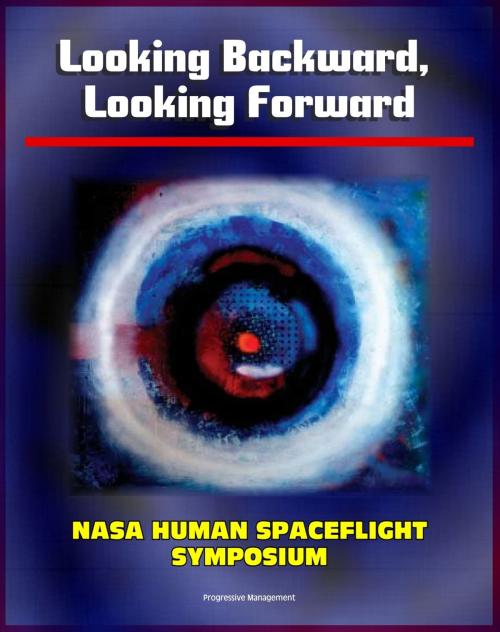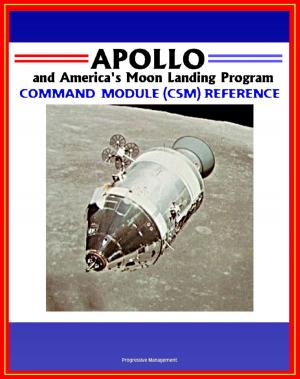Looking Backward, Looking Forward: Forty Years of U.S. Human Spaceflight Symposium - Essays on Apollo, Shuttle, ISS, Mars, Ethics, Safety, Science, Exploration (NASA SP-2002-4107)
Nonfiction, Science & Nature, Science, Physics, Astronomy, Other Sciences, Philosophy & Social Aspects| Author: | Progressive Management | ISBN: | 9781466163645 |
| Publisher: | Progressive Management | Publication: | January 14, 2012 |
| Imprint: | Smashwords Edition | Language: | English |
| Author: | Progressive Management |
| ISBN: | 9781466163645 |
| Publisher: | Progressive Management |
| Publication: | January 14, 2012 |
| Imprint: | Smashwords Edition |
| Language: | English |
This NASA history document - converted for accurate flowing-text e-book format reproduction - contains sixteen fascinating essays about the past and future of spaceflight, written by some of the most important and famous figures in the space community: Buzz Aldrin, Frederick Gregory, Robert Crippen, Robert Zubrin, Homer Hickam, and others. Contents include: Human Spaceflight and American Society: The Record So Far—Charles Murray * The Spaceflight Revolution Revisited — William Sims Bainbridge * Mutual Influences: U.S.S.R.-U.S. Interactions During the Space Race — Asif Siddiqi * Making Human Spaceflight as Safe as Possible — Frederick D. Gregory * What If? Paths Not Taken — John M. Logsdon * Apollo and Beyond — Buzz Aldrin * Breaking in the Space Shuttle — Robert Crippen * Going Commercial — Charles Walker * Science in Orbit — Mary Ellen Weber * Training for the Future—T. J. Creamer * Expanding the Frontiers of Knowledge — Neil de Grasse Tyson * Pushing Human Frontiers — Robert Zubrin * About an Element of Human Greatness — Homer Hickam * The Ethics of Human Spaceflight — Laurie Zoloth * Future Visions for Scientific Human Exploration — James Garvin * Preparing for New Challenges — William Shepherd.
The first panel focused on the experience of spaceflight and featured an Apollo astronaut, one of the first Shuttle astronauts, a scientist, a commercial payload specialist, and an astronaut trainee who had not flown in space yet. Buzz Aldrin talked about his unusual career path to the Moon and about a future launch vehicle system that enthralls him. T. J. Creamer spoke about the continuity of building on the achievements of others before him and specifically mentioned how the daughter of another panelist, Bob Crippen, was a trainer for his astronaut class. Scientist Mary Ellen Weber discussed how significant micro-gravity research could be for the average person on Earth and also enthralled listeners with her experience of having to look down from on orbit at incoming meteorites. Charlie Walker, the first astronaut to fly specifically on behalf of a company, covered how NASA could best work together with private industry. The second panel featured a variety of historical perspectives on the past forty years. The distinguished speakers covered such specific topics as Soviet-American reactions during the space race, the importance of safety, and counterfactual history. The author of a monumental volume on the Soviet space program, Asif Siddiqi, reinforced how the perceptions, misperceptions, actions, and reactions of the U.S. and the U.S.S.R. created the dimensions of the space race. John Logsdon posed a number of "what if" questions to push historians to rethink our assumptions of the causes of key events. Astronaut and manager Fred Gregory discussed how thinking about reliability has shifted from forcing people to demonstrate a specific safety flaw before a launch would be postponed to the current situation, where managers must actively show that it is safe to launch. William Sims Bainbridge revised his arguments about the social and cultural aspects of the "spaceflight revolution." In the afternoon, another panel looked at the future of human spaceflight. A variety of speakers, from engineers and scientists to a philosopher and a popular author, gave their provocative opinions on the challenges facing human spaceflight. Astrophysicist Neil de Grasse Tyson challenged space buffs to think of a major engineering or scientific project in history that was not begun for at least one of three reasons—national security, economics, or ego gratification. Robert Zubrin, a passionate advocate of human missions to Mars, echoed Frederick Jackson Turner's famous frontier thesis that it is our destiny to explore new worlds.
This NASA history document - converted for accurate flowing-text e-book format reproduction - contains sixteen fascinating essays about the past and future of spaceflight, written by some of the most important and famous figures in the space community: Buzz Aldrin, Frederick Gregory, Robert Crippen, Robert Zubrin, Homer Hickam, and others. Contents include: Human Spaceflight and American Society: The Record So Far—Charles Murray * The Spaceflight Revolution Revisited — William Sims Bainbridge * Mutual Influences: U.S.S.R.-U.S. Interactions During the Space Race — Asif Siddiqi * Making Human Spaceflight as Safe as Possible — Frederick D. Gregory * What If? Paths Not Taken — John M. Logsdon * Apollo and Beyond — Buzz Aldrin * Breaking in the Space Shuttle — Robert Crippen * Going Commercial — Charles Walker * Science in Orbit — Mary Ellen Weber * Training for the Future—T. J. Creamer * Expanding the Frontiers of Knowledge — Neil de Grasse Tyson * Pushing Human Frontiers — Robert Zubrin * About an Element of Human Greatness — Homer Hickam * The Ethics of Human Spaceflight — Laurie Zoloth * Future Visions for Scientific Human Exploration — James Garvin * Preparing for New Challenges — William Shepherd.
The first panel focused on the experience of spaceflight and featured an Apollo astronaut, one of the first Shuttle astronauts, a scientist, a commercial payload specialist, and an astronaut trainee who had not flown in space yet. Buzz Aldrin talked about his unusual career path to the Moon and about a future launch vehicle system that enthralls him. T. J. Creamer spoke about the continuity of building on the achievements of others before him and specifically mentioned how the daughter of another panelist, Bob Crippen, was a trainer for his astronaut class. Scientist Mary Ellen Weber discussed how significant micro-gravity research could be for the average person on Earth and also enthralled listeners with her experience of having to look down from on orbit at incoming meteorites. Charlie Walker, the first astronaut to fly specifically on behalf of a company, covered how NASA could best work together with private industry. The second panel featured a variety of historical perspectives on the past forty years. The distinguished speakers covered such specific topics as Soviet-American reactions during the space race, the importance of safety, and counterfactual history. The author of a monumental volume on the Soviet space program, Asif Siddiqi, reinforced how the perceptions, misperceptions, actions, and reactions of the U.S. and the U.S.S.R. created the dimensions of the space race. John Logsdon posed a number of "what if" questions to push historians to rethink our assumptions of the causes of key events. Astronaut and manager Fred Gregory discussed how thinking about reliability has shifted from forcing people to demonstrate a specific safety flaw before a launch would be postponed to the current situation, where managers must actively show that it is safe to launch. William Sims Bainbridge revised his arguments about the social and cultural aspects of the "spaceflight revolution." In the afternoon, another panel looked at the future of human spaceflight. A variety of speakers, from engineers and scientists to a philosopher and a popular author, gave their provocative opinions on the challenges facing human spaceflight. Astrophysicist Neil de Grasse Tyson challenged space buffs to think of a major engineering or scientific project in history that was not begun for at least one of three reasons—national security, economics, or ego gratification. Robert Zubrin, a passionate advocate of human missions to Mars, echoed Frederick Jackson Turner's famous frontier thesis that it is our destiny to explore new worlds.















